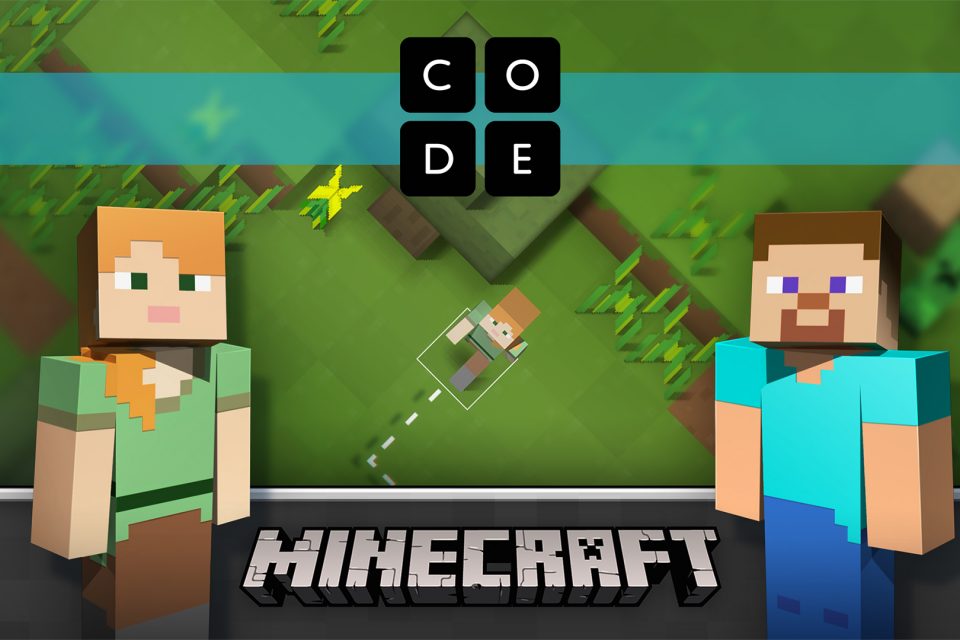REDMOND, Wash. — Nov. 16, 2015 — Microsoft Corp., Mojang AB, and Code.org on Monday unveiled a “Minecraft” coding tutorial for students and educators, created especially for the third-annual Hour of Code, a campaign to broaden global participation in computer science, held during Computer Science Education Week, Dec. 7–13. The new tutorial, now available at https://www.code.org/mc, introduces players to basic coding within the fun and popular “Minecraft” environment. Created by “Minecraft” game designers together with Code.org, the tutorial features Steve and Alex from “Minecraft” and “Minecraft”-inspired challenges that will be familiar to its more than 100 million players around the world.
“A core part of our mission to empower every person on the planet is equipping youth with computational thinking and problem-solving skills to succeed in an increasingly digital world,” said Satya Nadella, chief executive officer, Microsoft. “With ‘Minecraft’ and Code.org, we aim to spark creativity in the next generation of innovators in a way that is natural, collaborative and fun.”
Designed for ages 6 and up, the “Minecraft” tutorial introduces players to basic coding skills, encouraging them to navigate, mine, craft and explore in a 2-D “Minecraft” world by plugging together blocks to complete all actions and generate computer code. Players are offered a set of 14 challenges, including free play time, to explore coding concepts they’ve learned through the tutorial.
“‘Minecraft’ is a special game that girls and boys alike often can’t be pried away from,” said Code.org CEO and Co-founder Hadi Partovi. “Microsoft continues to be Code.org’s most generous donor and one of the largest supporters of the worldwide movement to give every student the opportunity to learn computer science. This year’s ‘Minecraft’ tutorial will empower millions of learners around the world to explore how a game they love actually works and will inspire them to impact the world by creating their own technology or apps.”
To date, more than 100 million students across 180 countries and 40 languages have participated in the Hour of Code, including one in three students in U.S. schools. This year, the campaign expects to exceed 100,000 events during Dec. 7−13 and to continue introducing more girls and underrepresented students of color to this foundational 21st century field.
In support of Code.org and the global Hour of Code campaign, Microsoft will also lead thousands of Hour of Code events in more than 50 countries around the world. Events will take place at Microsoft stores, offices and innovation centers as well as facilities of Microsoft’s YouthSpark nonprofit partners and schools. They will be led by over 7,000 Microsoft Student Partners, Most Valuable Professionals (MVPs) and employee volunteers. In addition, Microsoft is gifting Windows Store credit to every educator who organizes an Hour of Code event worldwide.
About Code.org
Launched in 2013, Code.org® is a non-profit dedicated to expanding access to computer science, and increasing participation by women and underrepresented students of color. Its vision is that every student in every school should have the opportunity to learn computer science. Code.org believes computer science should be part of core curriculum, alongside other courses such as biology, chemistry or algebra.
For more information, visit https://www.Code.org.
About Microsoft
Microsoft (Nasdaq “MSFT” @microsoft) is the leading platform and productivity company for the mobile-first, cloud-first world, and its mission is to empower every person and every organization on the planet to achieve more.
About Mojang
Mojang is a game development studio based in Sweden, best known for developing “Minecraft.” In 2014, Mojang joined Microsoft Studios to continue work on “Minecraft” and bring their vision, creative energy and innovative mindset to the development of future games.
Note to editors: For more information, news and perspectives from Microsoft, please visit the Microsoft News Center at http://news.microsoft.com. Web links, telephone numbers and titles were correct at time of publication, but may have changed. For additional assistance, journalists and analysts may contact Microsoft’s Rapid Response Team or other appropriate contacts listed at https://news.microsoft.com/microsoft-public-relations-contacts.






